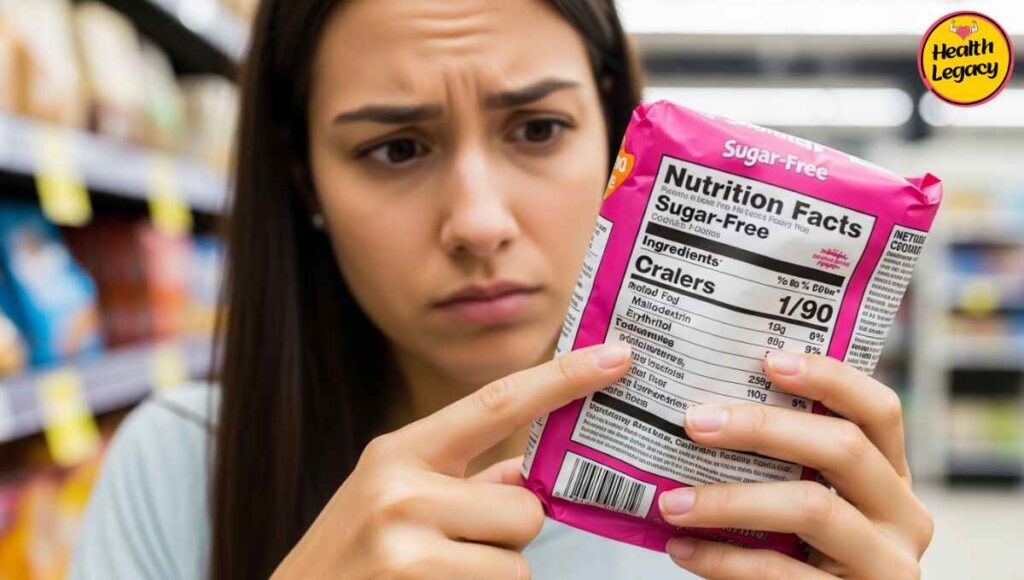The Hidden Dangers of Sugar Substitutes: What You Need to Know Now!
Have you ever wondered if that sugar-free soda or low-calorie snack is really as healthy as it seems? Sugar substitutes, also known as artificial sweeteners or non-nutritive sweeteners, have become a go-to for many folks trying to cut calories or keep their blood sugar in check. But here’s the kicker: recent studies have started raising red flags about their safety—especially when it comes to a popular sugar substitute called erythritol and its potential link to stroke risk.

At Health Legacy, we’re all about digging into the latest health info and serving it up straight. Our team, including health journalist Devanshi Priya—who’s got over a decade of experience—has sifted through the research to bring you this deep dive. We’ll walk you through what sugar substitutes are, their perks, the risks you should know about, and how to use them without worry. Plus, we’ll zoom in on the whole erythritol and stroke situation to help you figure out what’s best for your health.
So, grab a cup of tea (sweetened or not!), and let’s unpack the sweet—and not-so-sweet—world of sugar substitutes.

What Are Sugar Substitutes?
Sugar substitutes are your ticket to sweetness without piling on the calories or sugar that regular table sugar brings to the table. They’re used in everything from diet sodas to sugar-free gum, and they come in a few different flavors—figuratively speaking. Let’s break down the main types:
1. Artificial Sweeteners
These are lab-made sweeteners that pack a punch—way sweeter than sugar, so you don’t need much. Here are the big players:
- Aspartame: About 200 times sweeter than sugar. You’ll find it in diet sodas and sugar-free goodies, but it’s not great for baking since it breaks down with heat.
- Saccharin: Around 300 times sweeter than sugar, with a slightly bitter kick. It’s been around forever—think baked goods and soft drinks.
- Sucralose: A whopping 600 times sweeter than sugar and tough enough to handle cooking and baking. It’s a fave in tons of products.
2. Sugar Alcohols
These are carbs found in some fruits and veggies, but they’re also whipped up in factories. They’ve got fewer calories than sugar and a different vibe. Check these out:
- Erythritol: About 60-80% as sweet as sugar with almost no calories. It’s a star in keto-friendly stuff.
- Xylitol: Matches sugar’s sweetness and pops up in gum and dental products—good for your teeth!
- Sorbitol: Less sweet than sugar, often in sugar-free treats. Bonus: it can double as a laxative in big doses.
3. Novel Sweeteners
These come from plants and are pitched as the “natural” choice. They’re gaining fans fast:
- Stevia: Pulled from the stevia plant, it’s 200-400 times sweeter than sugar with zero calories. It’s got a slight licorice twist.
- Monk Fruit Extract: From monk fruit, it’s 150-200 times sweeter than sugar and calorie-free—perfect for a clean label.
All these sweeteners get the green light from the FDA, meaning they’re safe as long as you don’t overdo it. But research keeps poking at their long-term effects, so let’s see what’s on the plus side.

Benefits of Sugar Substitutes
Why do people love sugar substitutes? They’ve got some solid perks that make them a hit, whether you’re in the U.S. dodging obesity stats or in India managing diabetes. Here’s the rundown:
1. Calorie Reduction
Sw Ironing out calories is a big draw. A regular cola’s got about 150 calories from sugar, while a diet version with aspartame? Zero. That’s a win for weight management, especially with obesity rates climbing everywhere. In the U.S., over 40% of adults are obese, and in India, it’s creeping up too—around 20% now. Swapping sugar for substitutes can make a dent.
2. Blood Sugar Control
For folks with diabetes or anyone watching their glucose, sugar substitutes don’t spike blood sugar like the real stuff does. That’s huge in India, where diabetes affects over 77 million people, or in the U.S., where it’s about 34 million. Stable blood sugar means better health, plain and simple.
3. Dental Health
Sugar feeds the bacteria that wreck your teeth, but sugar substitutes? They don’t. Whether you’re sipping a sugar-free lassi in Mumbai or a diet soda in Colorado, your smile’s safer.
These perks make sugar substitutes a no-brainer for many—but hold up, there’s a flip side we can’t ignore.

Risks and Controversies of Sugar Substitutes
Sure, sugar substitutes sound like a dream, but they’ve got some baggage. Let’s dig into the general worries first, then zoom in on erythritol.
General Concerns
- Weight Gain (Yep, Really)
Crazy, right? A 2005 University of Texas study found diet soda drinkers had a higher obesity risk. The theory? Sweeteners might mess with your appetite or metabolism. More research is still cooking on this one. - Metabolic Issues
Some studies hint that artificial sweeteners could tweak insulin sensitivity or up your chances of type 2 diabetes. The World Health Organization (WHO) even chimed in, saying non-sugar sweeteners don’t deliver long-term weight wins and might carry risks. - Gut Health
Your gut’s a big deal, and sweeteners like sucralose might shake things up. Animal studies show it can cut down good bacteria, which could mess with digestion or metabolism.
Now, let’s get to the hot topic: erythritol and its potential health risks.

Erythritol and Stroke Risk: What’s the Deal?
Erythritol is everywhere—keto snacks, sugar-free drinks, you name it. But recent research has folks buzzing about its possible link to stroke risk. Let’s break down what the studies say.
University of Colorado Boulder Study
Published in the Journal of Applied Physiology, this lab study looked at how erythritol affects brain blood vessel cells. Here’s what they found:
- Less Nitric Oxide: This stuff keeps blood vessels relaxed. Less of it means tighter vessels and less blood flow.
- More Endothelin-1: This protein squeezes blood vessels, upping the chance of blockages.
- Lower t-PA: Tissue plasminogen activator breaks down clots. Less of it? Clots stick around longer—bad news for stroke risk.
- Higher ROS: Reactive oxygen species can damage cells, spark inflammation, and harden arteries (atherosclerosis).
The takeaway? Erythritol might make brain blood vessels less happy, which could nudge up stroke risk. But here’s the catch: this was a lab study, not real people. It’s a warning sign, not proof—yet.
Cleveland Clinic Study (2023)
This one’s bigger—over 4,000 people. They found folks with higher erythritol levels in their blood had more heart attacks and strokes within three years. It’s not just lab talk anymore; this ties erythritol to real-world cardiovascular risks.
So, Should You Panic?
Not quite. The FDA still calls erythritol safe, and plenty of experts say moderate use is fine. But if you’re chugging sugar-free stuff like it’s water—especially with erythritol—maybe pump the brakes a bit.

How to Use Sugar Substitutes Safely
Love your sugar substitutes but want to play it smart? Here’s how:
1. Moderation is Your Friend
Stick to the FDA’s acceptable daily intake (ADI). For aspartame, it’s 50 mg per kg of body weight. A 150-pound person could handle about 18 diet sodas a day. (But, uh, don’t.)
2. Read Those Labels
Scan for erythritol, sucralose, or whatever you’re using. Got health quirks? Know what’s in there.

3. Talk to Your Doc
Got diabetes, pregnant, or other conditions? Ask your healthcare pro what’s cool for you. People with PKU, for instance, should skip aspartame—it’s got phenylalanine.
4. Mix It Up
Don’t lean on one sweetener. Use stevia for baking, a little erythritol in drinks, and maybe some honey now and then.
5. Go Natural
Worried about risks? Try these natural sweeteners:
- Honey: Packed with antioxidants, but it’s calorie-heavy and hits blood sugar.
- Maple Syrup: Brings zinc and manganese—use it light, though.
- Fruits: Bananas, dates, or applesauce sweeten naturally with fiber and nutrients.
- Spices: Cinnamon, vanilla, or nutmeg boost flavor without sugar.
At Health Legacy, we’re all about giving you the tools to choose wisely. Pro tip: ease off sweeteners over time—your taste buds will adjust, whether you’re in a Mumbai market or a U.S. kitchen.

Conclusion
Sugar substitutes can be a game-changer for cutting calories and managing diabetes, but they’re not perfect. The latest scoop on erythritol and stroke risk—plus other worries like weight gain or gut issues—shows you’ve gotta stay sharp. Moderation and variety are your best bets.
At Health Legacy, we’re here with the facts, backed by pros like Devanshi Priya, who’s spent years in health journalism. We keep it real, human-written, and 100% trustworthy. Life’s tricky enough—health choices shouldn’t be. Balance is key, so listen to your body and chat with your doc when in doubt. Your health’s worth it.

FAQs
1. What are sugar substitutes?
They’re sweeteners that replace sugar in food and drinks—think artificial sweeteners like aspartame, sugar alcohols like erythritol, or natural sweeteners like stevia.
2. Are sugar substitutes safe?
Most are FDA-approved and fine within limits. But studies hint at risks—like erythritol and stroke—so don’t go overboard.
3. Does erythritol cause stroke?
Research suggests it might mess with brain blood vessels, upping stroke risk. It’s not a done deal, but if you’re at risk, take it easy.
4. Which sugar substitute is best for health?
Depends on you. Stevia or monk fruit are solid natural picks, but moderation’s the name of the game—ask your doc.
5. Can sugar substitutes help with weight loss?
They cut calories, but WHO says they’re not a magic bullet for weight control. Some studies even link them to gain—use ‘em smart.
6. Are there natural alternatives to artificial sweeteners?
Yep! Honey, maple syrup, stevia, monk fruit, or fruits like dates. They’ve got nutrients but watch the sugar hit.
7. How do sugar substitutes affect blood sugar levels?
Most don’t spike it—great for diabetes management. Some sugar alcohols like sorbitol might nudge it a bit, so check your response.
Also Read :
- Health Benefits of Having a Routine | Northwestern Medicine
- 10 habits for good health – Harvard Health
- Dimensions of wellness: Change your habits, change your life – PMC
- Changing Your Habits for Better Health – NIDDK
- Setting SMART goals for success – Mayo Clinic Health System
- Be SMART about setting health-related goals | Aging | Diet and Nutrition | Prevention | UT Southwestern Medical Center
- How to Create a Balanced Wellness Routine That Works for You – The Coach Space
- 5 Important Components of Health-Related Fitness
- Ozempic: How This GLP-1 Drug Is Transforming Weight Loss Journeys Worldwide
- Best Exercise For Weight Loss and Get Fit
External sources :
- ScienceDaily: Popular sugar substitute linked to brain cell damage and stroke risk
- Global News: Study links sugar-free sweetener to increased stroke risk
- SciTechDaily: Scientists Warn: Popular Sugar Substitute Linked to Brain Cell Damage
- Johns Hopkins Medicine: Facts About Sugar and Sugar Substitutes
- FamilyDoctor.org: Sugar Substitutes
- WHO: Use of non-sugar sweeteners: WHO guideline
- Cleveland Clinic: Study Finds Common Artificial Sweetener Linked to Higher Rates of Heart Attack and Stroke




